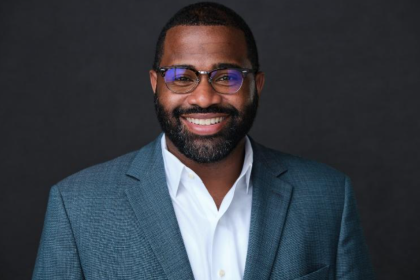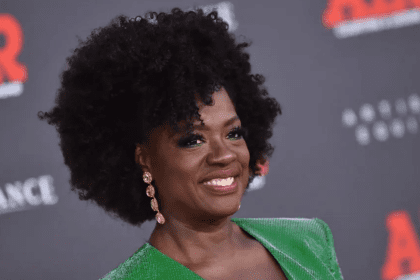As I sat down with Dr. Crystal Aguh, a powerhouse in the field of dermatology, I quickly realized we were diving into far more than skin and hair. This was a conversation about health equity, about bridging gaps in care, and about how the field of dermatology can—and must—do better in addressing the unique needs of marginalized communities, particularly Black women.
Dr. Aguh, an Associate Professor at Johns Hopkins and the Director of the Ethnic Skin Program, is making waves for her groundbreaking work on skin conditions that disproportionately affect minority populations, especially Black women. But her focus on alopecia, a condition that causes hair loss, is where she’s truly pioneering change.
A personal connection to hair loss and equity
When asked what inspired her to focus on alopecia, Dr. Aguh didn’t hesitate. “I’ve struggled with my hair my entire life,” she said. This personal connection sparked her passion for understanding hair loss, particularly in Black women. The type of hair loss she studies, Central Centrifugal Cicatricial Alopecia (CCCA), primarily impacts Black women and leads to permanent scarring and hair loss.
In her early years of practice, Dr. Aguh noticed something troubling—doctors often gave patients little to no answers when it came to CCCA. “Doctors were telling women, ‘Oh, it’s caused by hot combing,’” she recalled. But many of these women weren’t using hot combs, and their concerns were dismissed. This lack of adequate care drove Dr. Aguh to delve deeper into the science behind hair loss in Black women.
More than just vanity
Alopecia is about more than just hair. It’s about identity, confidence, and mental health—especially for women of color. Hair, for Black women in particular, is deeply intertwined with beauty standards and self-perception. Dr. Aguh noted that many women suffering from alopecia feel ashamed, often apologizing for being “vain” when seeking treatment. But as she reminds her patients, it’s not vanity at all.
Dr. Aguh referenced a study from the 1990s in which 10% of women undergoing chemotherapy for breast cancer refused treatment due to the fear of losing their hair. “Imagine that,” she said, “Women were willing to put their lives at risk just to preserve their hair.” This speaks volumes about the importance of hair in women’s lives, particularly in cultures where hair is seen as a critical element of beauty.
And it’s not just about hair. Dr. Aguh emphasized that dermatological conditions are visible, making them harder to ignore in a society that prioritizes appearance. “If you have high blood pressure, no one knows unless you tell them. But if you have a skin condition, people can see it,” she explained. This adds an extra layer of social pressure and psychological burden for those suffering from alopecia.
Shifting the paradigm
One of the biggest barriers Dr. Aguh has faced is a lack of focus on hair in dermatological training. She pointed out that many dermatologists feel confident advising patients on skincare but fall short when it comes to hair care. “If I tell a dermatologist to recommend a shampoo for a patient, they might respond, ‘I’m not a hairstylist.’ But it’s still science!” she said with palpable frustration.
This dismissiveness towards hair care among dermatologists is more than an oversight; it’s a symptom of a larger issue—medical systems not valuing the specific needs of marginalized groups. For Black women, whose hair requires different care due to its unique texture and sensitivity, the stakes are high. Using the wrong shampoo or treatment can lead to severe hair breakage, exacerbating conditions like alopecia.
Dr. Aguh has made it her mission to educate dermatologists on the importance of hair care, urging them to see it as an extension of the skin. After all, the same principles that apply to skin health—knowing which ingredients are beneficial and which are harmful—also apply to hair. Her message to dermatologists is clear: “We need a paradigm shift.”
Reaching the public and the medical community
Dr. Aguh is not just advocating for change within the medical community. She’s also dedicated to educating the general public, especially women of color who may not know how to properly care for their hair. To this end, she has authored several books, including 90 Days to Beautiful Hair and 90 Days to Beautiful Curly Hair, offering practical advice on how to maintain healthy hair.
She’s also written a guide for parents, helping them teach their children to embrace and care for their natural hair from a young age. Dr. Aguh understands the generational impact of improper hair care, noting that many mothers in the 90s who didn’t know how to manage their daughters’ hair resorted to relaxing it at a young age. Today, she sees a similar trend with parents who put their toddlers in tight braids, leading to early onset alopecia.
Her work extends beyond the written word. Dr. Aguh is a frequent speaker at national and international conferences, where she educates both her peers and the public about the importance of hair care, health equity, and how dermatology can be a gateway to addressing broader health disparities.
The power of knowledge and action
What stood out most in my conversation with Dr. Aguh was her passion for bridging the gap between dermatology and health equity. Hair loss might seem like a niche issue, but it’s a gateway to addressing larger systemic inequalities in healthcare. Her work is more than just treating hair—it’s about empowering women, educating doctors, and shifting paradigms to ensure that marginalized communities receive the care they deserve.
As we continue to push for health equity, conversations like these are essential. Because as Dr. Aguh so eloquently put it, “We can’t get time back.” The sooner we address these issues, the closer we’ll be to a future where everyone feels seen, heard, and cared for—both in the doctor’s office and beyond.
AI assisted in summarizing this episode of Equity in Focus.











